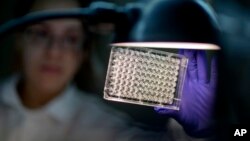Antibiotic resistance is a growing problem worldwide. One of the biggest culprits is treatment for routine colds. Experts say doctors often send their patients home with prescriptions for antibiotics because they can not determine the source of the illnesses.
Researchers concerned about the overuse of antibiotics have developed a blood test to help physicians determine whether patients' colds are the result of bacterial or viral infections.
Ephraim Tsalik, a professor of medicine at Duke University in Durham, North Carolina, and an emergency room physician, said viral infections do not respond to antibiotics, and if such drugs are prescribed unnecessarily, there is the risk of creating resistance to antibiotics in the patient over time.
“When you magnify that against millions of people who are getting antibiotics unnecessarily, what might have been a small risk becomes a very real one across the population,” Tsalik said.
The study by Tsalik and his colleagues, described in the journal Science Translational Medicine, involved 31 people, 10 with bacterial pneumonia and 21 with a flu virus.
From these, investigators developed the profiles of about 20,000 genes. The gene activity is different, depending upon whether someone is infected with a bacterium or a virus.
Then, the researchers tested the blood samples of 300 sick patients. The microbes included rhinoviruses and strep infections.
Tsalik and his team compared the results to the gene profiles of people who were not sick, "and we found we got an accuracy of 87 percent" in distinguishing noninfectious from infectious illness and bacterial from viral causes, "which we very excited to see, considering there is really very little out there and just about any ability to discriminate between these different groups is an improvement over the current state.”
Currently, it takes one day for the gene expression test to yield a result. Tsalik said researchers are trying to whittle the processing time down to an hour or less.




